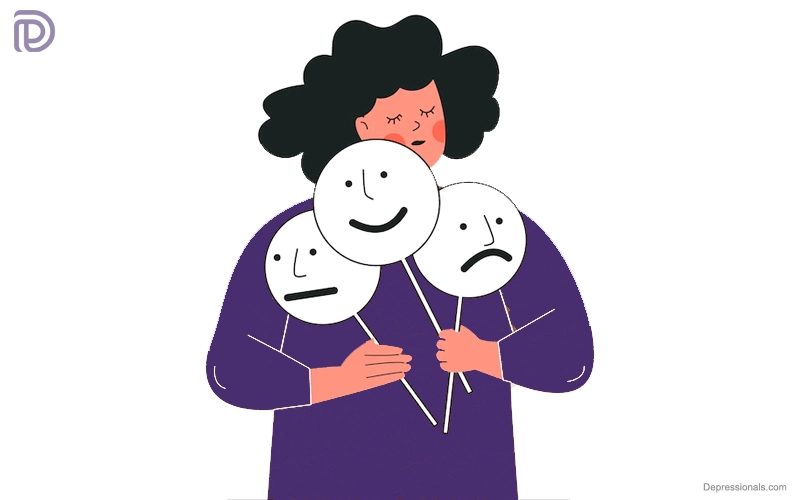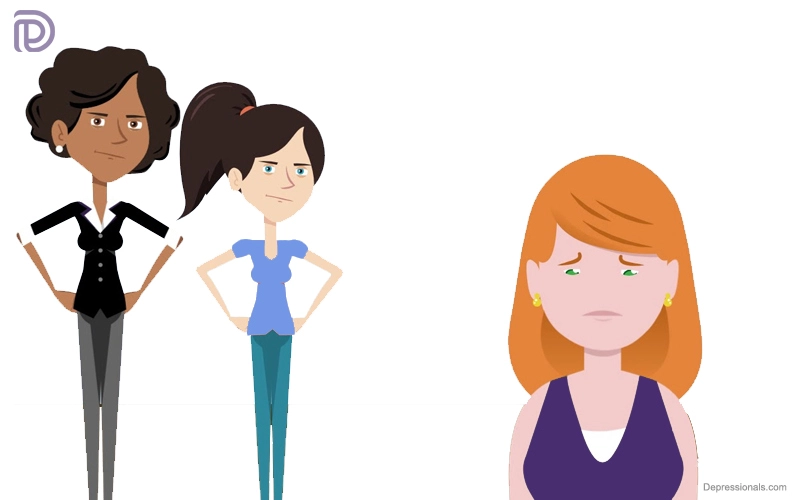Avoidant Personality Disorder (AVPD) is associated with feelings of inadequacy, low self-esteem and sensitivity to rejection that can adversely affect work situations and relationships.
It is known as Cluster C personality disorder or anxious and fearful personality disorder because it is characterized by extreme shyness and sensitivity to criticism from others.
There is a tendency for AVPD to be accompanied by other mental health conditions. One example is a social anxiety disorder. They avoid situations out of fear of rejection or disapproval, which is extremely painful to them. In the United States, there are roughly equal numbers of males and females suffering from this disorder.
Read: 15 Signs of Egoistic Person
Avoidant personality disorder symptoms
A list of common symptoms of avoidant personality disorder follows:
- Having to be liked by others
- Anhedonia (lack of enjoyment in activities)
- Fear of doing or saying the wrong thing
- Social anxiety
- Getting along with others (people-pleasing)
- Turning down promotions or avoiding interactions at work
- Sharing intimate feelings or avoiding intimate relationships
- Making decisions without considering the consequences
- Rejection-avoidance
- Refusing to attend social events
- Criticized or disapproved of easily
- Self-consciousness to the extreme
- Contact with others is not initiated
- A tense and fearful demeanor
- Inadequacy feelings
- Negative evaluations make you hypersensitive
- Lack of assertiveness
- An inability to trust others
- Insecurities about the future
- Negatively interpreting neutral situations
- Inability to maintain a social network/no close friends
- Self-isolating
- Inhibition of social interaction
- Intolerance of risk or inexperience
- Social incompetence or inferiority complex
- Pay attention to signs of rejection or disapproval
Also, check: Side Effects of Overthinking
How common is avoidant personality disorder?
The prevalence of avoidant personality disorder in the U.S. is estimated at 2.4%. Approximately the same number of women as men suffer from this disorder. Children with avoidant personality disorder often notice symptoms in childhood and the symptoms may become more noticeable in adolescence or early adulthood. A person with avoidant personality disorder is usually not diagnosed until they are aged 18 or older since these patterns of behavior should persist for an extended period of time and not readily disappear.
Avoidant personality disorder causes

Psychological, genetic, environmental, and social factors may all be involved in the development of avoidant personality disorder. It is possible for children who are abused, taunted, or ridiculed as well as deprived of affection and nurturing by their parents or caregivers to develop this disorder if there are also other factors present. It may also be risky to be rejected by your peers.
The disorder is usually diagnosed as a child when the individual is very shy and continues to be shy as an adult.
Avoidant personality disorder shares many symptoms and genetic markers with social anxiety disorder, with AVPD being the more severe form.
Related conditions
There is a possibility that avoidant personality disorder can overlap or co-occur with other conditions, including:
- Social anxiety disorder
- Dependent personality disorder
- Borderline personality disorder (BPD)
- Substance use disorder
- Depression
- Agoraphobia
Recommended: How to help someone with Depression
Check: Types of Overthinking
Diagnosis of APD
Obtaining a diagnosis of an avoidant personality disorder requires trained mental health professionals who utilize the Diagnostic and Statistical Manual of Mental Disorders (DSM-5) as a guideline. If your physician cannot provide a diagnosis, he or she should refer you to a psychologist, psychiatrist, or another mental health professional.
A personality disorder that primarily affects adults is an avoidant personality disorder. Children’s personalities still develop when they grow up and behaviors such as shyness are typically part of their everyday lives.
In order to meet DSM-5 criteria for being diagnosed with depression, an individual must be an avoidant social agent, overly sensitive to criticism and rejection, and feel inadequate.
- Fear of criticism, disapproval, or rejection as a basis for avoiding occupational activities involving significant social contact
- Being unwilling to engage in relationships unless certain that the other person will like you
- Fear of rejection or humiliation in intimate relationships
- Criticism and rejection play a large role in a person’s social life
- Social inhibition due to feeling inadequate in new situations
- Social incompetence, unattractiveness and inferiority complex
- Fear of embarrassment makes one hesitant to take risks or try new things
You should know about Agoraphobia
Avoidant personality disorder treatment
People with high functioning avoidant personality disorder typically do not seek treatment. When they do, they are most likely to do so to address a specific life problem or symptoms such as anxiety and depression, and they will usually discontinue treatment once the issue has been resolved.
People with an avoidant personality disorder may find psychotherapy difficult to accept as it is an enduring pattern of behavior. Because it persists, people with an avoidant personality disorder may find it difficult to adjust to the idea that psychotherapy is needed and can be beneficial.
When people who have high functioning avoidant personality disorder do not seek treatment, their outlook is rather bleak — they often isolate themselves and use avoidance as their sole coping mechanism.
A successful treatment, however, can help to reduce anxiety symptoms and improve coping strategies that a person can employ to deal with their anxiety. Avoidance won’t dominate the thoughts of someone with avoidant personality disorder, although they may be somewhat reserved.
Recommended: Multiple Strategies To Control Overthinking
Talk therapy
Psychodynamic therapy, cognitive-behavioral therapy (CBT), and schema therapy may be helpful for treating avoidant personality disorders. Group therapy and social skills training may also be helpful.
Psychodynamic therapy aims to understand how past experiences, pain, and conflict can contribute to present symptoms, while cognitive-behavioral therapy teaches how to change unhelpful thinking patterns.
The schema-based treatment for avoidant personality disorder incorporates psychotherapy, cognitive therapy, and many other treatment modalities into a comprehensive treatment course. With this method, therapists and clients focus on the relationship between them, while gaining insight into how they function in life and how to make changes based on re-engineering their early life experiences.
Schema therapy has been shown to be extremely effective in treating childhood adversity by teaching clients to communicate their needs to their parents and to develop and internalize their voices as parents.
Read: Signs of Self-Obsessed Person
Main Concepts of Schema Therapy
Schema therapy involves four main concepts that the client learns:
- Maladaptive schemas are recurring patterns throughout life. A pattern of separation and rejection, impairment of autonomy and performance, impairment of limits, excessive work responsibilities, and standards, and inhibition can be seen among the five categories.
- Childhood coping styles (e.g., escape, fighting back).
- How the member might cope by using schema modes that are not helpful (e.g., avoidance, detachment, compliance, punishment).
- Learn how to cope with and meet core emotional needs as an adult.
Read: How to Deal With a Narcissist
Medication
A person suffering from another related disorder like depression or anxiety may be prescribed medication to deal with those symptoms if they also suffer from an avoidant personality disorder.
An antidepressant medication might help improve mood and reduce anhedonia, and it may also help reduce rejection sensitivity.
Dealing with the situation
Recognition of the signs of avoidant personality disorder is the first step in improving the quality of life. If you know clearly what symptoms you are experiencing, your therapist will be able to find ways to combat them.
Make sure your friends and family understand what you’re going through and how to help, too, so they can be a better support system.
When you’re having a hard time, finding healthy ways to cope is equally critical, including finding coping skills that prevent you from using drugs or alcohol, smoking, overeating, or harming yourself.
Read: Top Stressful Life Events
Social Impact of Avoidant Personality Disorder
It is difficult to form meaningful relationships when you have avoidant personality disorder because of your fear of rejection. The likelihood of you becoming friends with another person may be low, unless you are 100% certain that you will get along with them. Relationships can make you feel uncomfortable talking about your feelings or sharing personal information. As a result, it can be challenging to maintain close friendships or intimate relationships.
An avoidant personality disorder is diagnosed when a person meets at least four criteria, which are listed in the Diagnostic and Statistical Manual of Mental Disorders (DSM-5) of the American Psychiatric Association:
- Fears criticism, disapproval, or rejection when it comes to occupational activities that involve significant interpersonal contact
- Lacks the confidence to engage with other people unless they’re sure they’ll be liked
- Fears being shamed or ridiculed within intimate relationships
- Feels threatened by criticism or rejection in social situations
- Identifies inadequacy as a reason for inhibiting new interpersonal relationships
- Feels unattractive or inferior to others because of social incompetence or lack of personal appeal
- Frequently avoids taking personal risks or taking part in new activities for fear of embarrassing themselves
The behavior is usually avoided in children and adolescents. However, it is not possible to diagnose a personality disorder in childhood because shyness, fear of strangers, social awkwardness, or being sensitive to criticism are often common developmental characteristics of children and adolescents.
Psychiatrists can diagnose your symptoms, suggest the best treatment options, and assess your symptoms.
Complications of avoidant personality disorder
It can cause long-term difficulties with work and social functioning for people who do not receive treatment for this disorder. Additionally, they are more likely to suffer from depression and substance abuse.
Bottom line
Avoidant personality disorder treatment takes a long time, as with other personality disorders. When an individual is willing to seek and stay in treatment, their success can be significantly influenced, as well as their outlook. A person with an avoidant personality disorder may be able to learn more effective ways of relating to others with treatment.






Will likely be back to get more. Thanks
This website online is mostly a stroll-through for the entire data you needed about this and didn’t know who to ask. Glimpse right here, and you抣l positively discover it.
Thanks for sharing your thinking.
It’s perfect time to make some plans for the long run and it is time to be happy. I have learn this post and if I may just I wish to counsel you some fascinating things or advice. Maybe you could write next articles referring to this article. I desire to read even more things about it!
This design is stellar! You most certainly know how to keep a reader entertained. Between your wit and your videos, I was almost moved to start my own blog (well, almost…HaHa!) Fantastic job. I really enjoyed what you had to say, and more than that, how you presented it. Too cool!
I’m truly enjoying the design and layout of your blog. It’s a very easy on the eyes which makes it much more pleasant for me to come here and visit more often. Did you hire out a designer to create your theme? Exceptional work!
Thank you for sharing all these wonderful content. In addition, the optimal travel in addition to a medical insurance plan can often eliminate those concerns that come with touring abroad. Any medical crisis can before long become too expensive and that’s certain to quickly impose a financial load on the family finances. Setting up the ideal travel insurance program before leaving is definitely worth the time and effort. Thanks
Heya i am for the first time here. I came across this board and I find It truly useful & it helped me out a lot. I hope to give something back and aid others like you helped me.
Howdy! I Appreciate this contribution!
This is the right blog for anyone who wants to find out about this topic. You notice a lot its almost laborious to argue with you (not that I actually would need匟aHa). You undoubtedly put a brand new spin on a subject thats been written about for years. Nice stuff, just nice!
Things i have continually told persons is that while searching for a good on-line electronics retail store, there are a few issues that you have to factor in. First and foremost, you should really make sure to discover a reputable along with reliable retailer that has obtained great evaluations and rankings from other shoppers and marketplace professionals. This will ensure that you are dealing with a well-known store to provide good assistance and aid to its patrons. Many thanks for sharing your ideas on this site.
I think other web site proprietors should take this site as an model, very clean and wonderful user genial style and design, let alone the content. You are an expert in this topic!
great points altogether, you just gained a brand new reader. What would you recommend about your post that you made some days ago? Any positive?
A lot of what you articulate happens to be supprisingly appropriate and that makes me ponder why I hadn’t looked at this in this light previously. Your piece truly did switch the light on for me personally as far as this particular subject matter goes. But there is actually one particular issue I am not too cozy with and while I make an effort to reconcile that with the actual core idea of your issue, allow me observe exactly what the rest of the visitors have to point out.Well done.
As I web-site possessor I believe the content material here is rattling great , appreciate it for your hard work. You should keep it up forever! Best of luck.
Very interesting blog. Alot of blogs I see these days don’t really provide anything that I’m interested in, but I’m most definately interested in this one. Just thought that I would post and let you know.
Hi, just required you to know I he added your site to my Google bookmarks due to your layout. But seriously, I believe your internet site has 1 in the freshest theme I??ve came across. It extremely helps make reading your blog significantly easier.
hello!,I like your writing so much! share we communicate more about your post on AOL? I require an expert on this area to solve my problem. May be that’s you! Looking forward to see you.